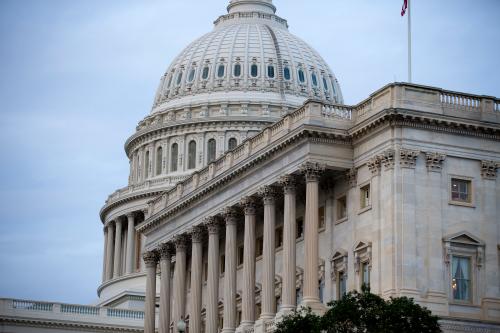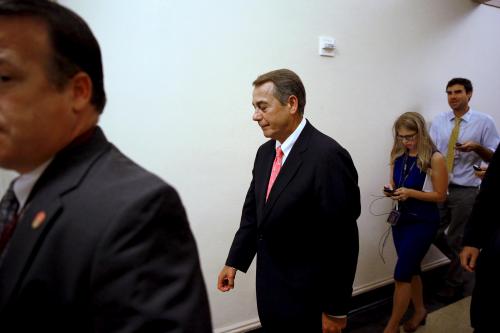It is getting harder and harder to see how the Republican Party as we have known it hangs together as a majority coalition much longer following the big news this week that President Donald Trump sided with Democratic leaders Nancy Pelosi and Chuck Schumer to support a three-part legislative package. It calls for: 1) providing immediate disaster relief funds for victims of Hurricane Harvey; 2) suspending the debt ceiling for 90 days; and 3) extending current levels of federal spending through December with a continuing resolution. Additionally, there are reports that Trump is seriously interested in working with Schumer and Democrats to permanently relegate the debt limit to the margins of congressional procedure, putting an end to the perennial specter of market-spooking (and politically distracting) debt ceiling standoffs. It is by far the administration’s best governance play to date, just the kind of businessman-cutting-through-government-BS that Trump’s supporters had hoped for in electing him.
Republicans in Congress are apparently feeling jilted. Trump apparently gave them no advance notice of his intentions, and his willingness to suspend the debt ceiling without any fiscal conditions goes against years of GOP demands during the Obama administration. The Republican Study Committee expressed its dismay, offering a familiar conservative wish list of spending cuts and process reforms that they say could win their support for a debt limit increase. Members of the hardline Freedom Caucus apparently stepped up conversations to oust Paul Ryan from his speakership, the better to keep Trump true to the conservative platform of the party whose nomination he rode to the White House. Various conservatives, including Heritage Action (which has been notably coy in its opposition to the Trump administration to date), denounced what they dubbed the “Pelosi-Schumer-Trump Debt Ceiling Deal.”
The central tension, which Trump has always embodied quite clearly, is that the Reagan-era political logic of shrinking social spending and taxes while promoting social conservatism and a strong military no longer has the power to bring together a majority of voters. Trump’s response has been abandon the first plank, offering a vague promise to protect the entitlements that many red-state working class voters heavily depend upon from any significant reforms while implying that the government may also be able to significantly expand efforts to support them. He couples that with savage rhetorical attacks on the inadequacy of the exiting political establishment, very much including current Republican leaders.
At a deep level, “Trumponomics” is clearly incompatible with “Ryanomics,” while sharing some obvious points of commonality with “Schumernomics” (“Chuckonomics”?). That has always spelled trouble for the GOP, especially given the bad blood that developed between Trump and the House Speaker during the late months of the 2016 campaign (and the exit from the White House of Reince Priebus, who was the clearest link between the two men). It is actually remarkable how much the political right managed to hang together through the first seven months of the Trump administration, pretending that there was a single agenda that they were all agreed upon. But the happy glow from the appointment of Neil Gorsuch to the Supreme Court can only last so long, and as must-pass bills force actual decisions it appears to be wearing off.
Business-friendly corporate tax reform is the one thing that is really holding the coalition together right now. It is a Ryan priority and a Trump priority—and it bears saying that there are some fairly big policy improvements there for the taking if the party can get its act together. The only way Republican congressional leaders have to reconcile themselves to Trump’s current overture to Democrats is to treat it as a tactical move that buys time that can be used to deliver a signature accomplishment on tax reform.
But—to put the point very gently—it is unclear that Republicans actually have a path to a consensus bill on tax reform that they can deliver in the next three months. The initial attempt to make a border tax the linchpin of a deal failed. Now the Freedom Caucus is apparently planning to debut its own version of a plan, in part to highlight their disappointments with the modest ambitions of Republican leadership. That could make getting to a compromise considerably more difficult, and tax reform could well end as Obamacare reform did—with Republicans falling short on a crucial vote and blaming each other.
Back in March I argued we should be thinking seriously about how a major partisan realignment could happen in the 2010s, as it did with the demise of the Whig Party in the 1850s. Trump plays the role of Zachary Taylor in this analogy: an outsider whose ambitions were incongruent with the party that elected him, and subsequently accelerated its demise. At this stage in his presidency, that continues to look like a live possibility. Trump’s apparent pivot toward Democrats has pundits across the political spectrum, from Matthew Yglesias to Ben Domenech, envisioning a refreshed Trump presidency based on a kind of populist triangulation, confusing the familiar lines of political contestation. Had Hillary Clinton become the 45th president, factions within the Republican Party could have locked arms in opposition to her (and her agenda). With Trump as their president, it is much harder for them to keep their internal contradictions in check.
That hardly means the GOP is about to fold up shop, especially given that it retains a dominant position in a majority of statehouses across the country. Any given mechanism of actual break-up, such as the abandonment of the GOP of a “rump faction” of regular-order-loving Senators, seems far-fetched in itself. But anyone who confidently predicts the party’s future, even as far as 2020, is kidding themselves.
The Brookings Institution is committed to quality, independence, and impact.
We are supported by a diverse array of funders. In line with our values and policies, each Brookings publication represents the sole views of its author(s).











Commentary
Is the GOP disintegrating after the Pelosi-Schumer-Trump deal?
September 8, 2017